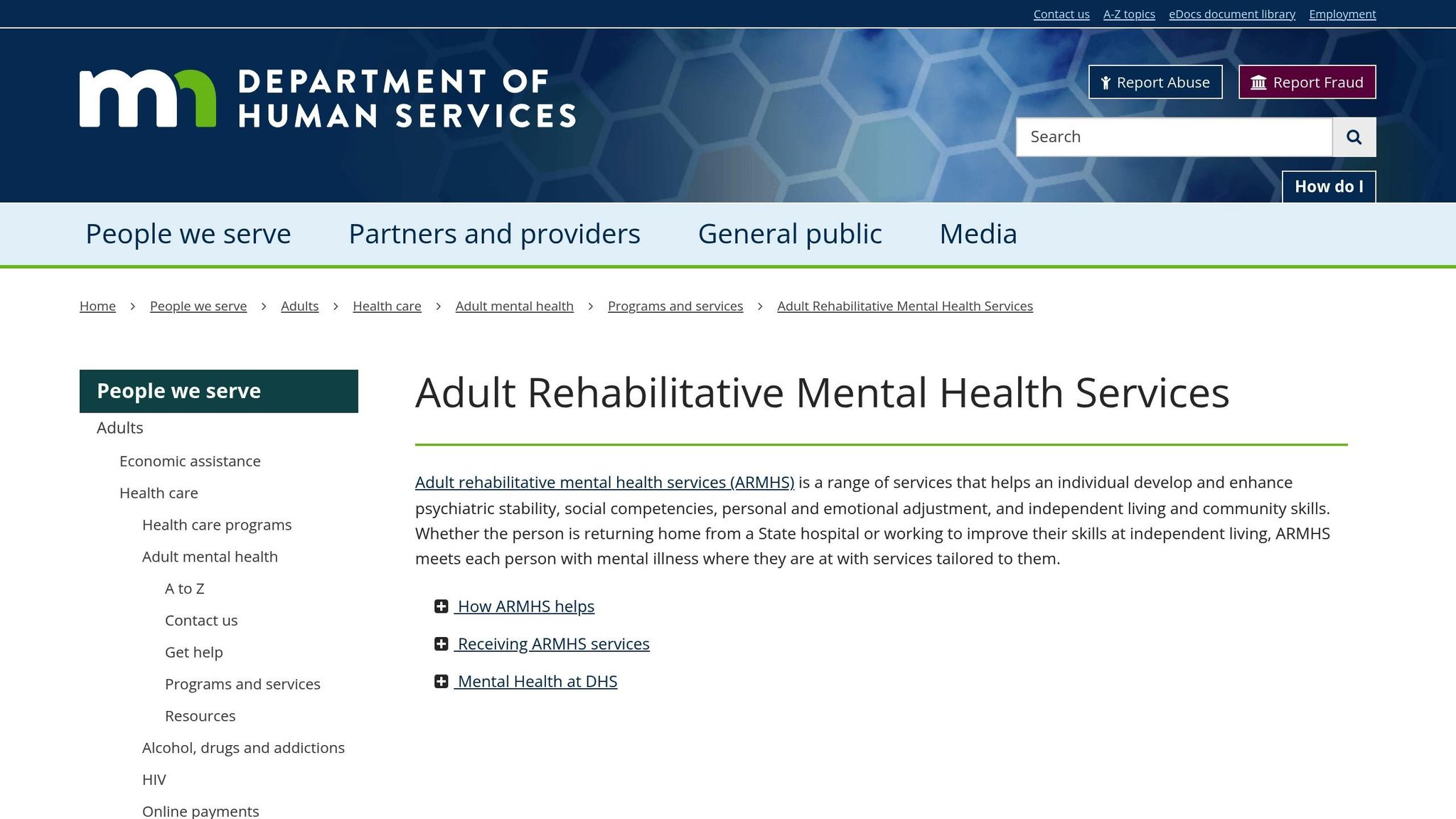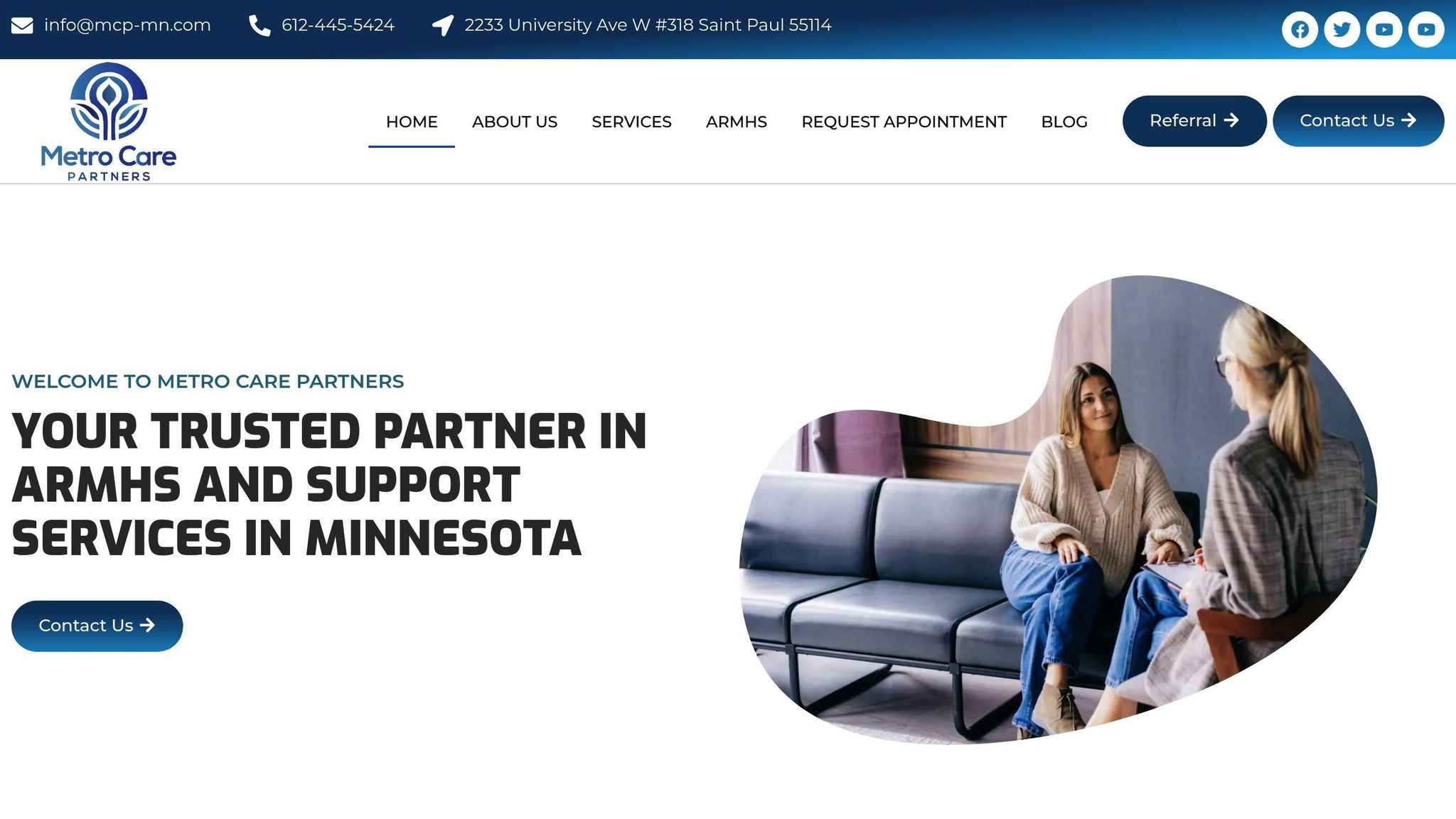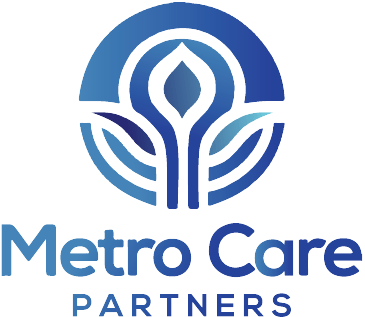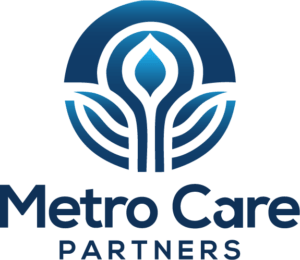Want to improve your social skills and build stronger connections? Here’s how social skills can boost your mental health recovery and daily life:
- Why It Matters: Social skills reduce isolation, lower stress, and improve communication. They’re key for forming meaningful relationships and managing mental health symptoms.
- Key Skills to Learn: Active listening, interpreting body language, setting boundaries, and expressing emotions effectively.
- How to Start: Practice through role-play, master communication basics, and learn to handle conflicts confidently.
- Programs That Help: Adult Rehabilitative Mental Health Services (ARMHS) offers structured training to develop these skills step by step.
- Track Your Progress: Set social goals, monitor your comfort levels, and celebrate milestones.
Strong social skills can transform your recovery journey and help you lead a more connected and fulfilling life. Keep reading to learn actionable tips and local resources to get started.
Social Skills Basics for Recovery
Core Social Skills Explained
Social skills are the backbone of effective human interaction and play a key role in mental health recovery. These skills help people communicate clearly and build relationships by focusing on several important areas:
| Skill Category | Description | Examples |
|---|---|---|
| Verbal | Structure and content of speech | Speaking clearly, appropriate tone, taking turns in conversation |
| Nonverbal | Body language | Maintaining eye contact, using facial expressions, respecting personal space |
| Paralinguistic | Voice qualities | Adjusting tone, pitch, and speaking pace |
| Social Perception | Recognizing social cues | Understanding situations, interpreting others’ reactions |
| Emotional Expression | Sharing feelings appropriately | Showing empathy, expressing care |
These components provide a framework for better communication and connection, which are essential for recovery. By mastering these skills, individuals gain tools to strengthen their mental health and relationships.
How Social Skills Help Recovery
Social skills make a big difference in recovery by reducing feelings of isolation, building a reliable support network, and improving confidence in everyday interactions. They also make it easier to connect with community resources.
"Social skills are important in the process of recovery and the training can help persons with social skill deficits to learn specific skills needed to live, learn and work in the community with minimum support".
Programs like ARMHS focus on teaching these skills in a structured way, offering a clear path toward greater independence and connection.
ARMHS Social Skills Training

ARMHS turns these essential skills into practical tools for recovery. The training process is broken down into six key steps:
1. Rationale
Practitioners explain the importance of specific social skills and how they contribute to recovery and everyday life.
2. Skill Breakdown
Complex interactions are simplified into smaller, actionable steps. For example, learning to maintain eye contact and avoid interrupting during active listening.
3. Demonstration
Practitioners demonstrate how to use these skills effectively through relatable, real-world scenarios.
4. Practice Sessions
Role-playing exercises allow participants to practice in a safe, supportive environment, helping them build confidence.
5. Constructive Feedback
Feedback focuses on specific improvements while recognizing and celebrating progress made.
6. Real-World Application
Clients apply their skills in daily life, with continued guidance and support to reinforce learning.
The program is flexible, offering both individual and group sessions tailored to each person’s unique needs. This approach ensures that participants can learn and grow in a way that works best for them.
PREP Webinar: Social Skills Training for Long-term …
5 Steps to Better Social Skills
Improve your social skills with these actionable techniques.
Practice Through Role-Play
Role-playing provides a low-pressure way to rehearse social interactions before stepping into real situations. It helps you boost confidence and sharpen both verbal and non-verbal communication.
- Start Simple: Focus on greetings and small talk. Practice making eye contact and showing friendly facial expressions.
- Record and Reflect: Record your practice sessions to identify areas for improvement.
- Increase the Challenge: Once you’re comfortable with basic interactions, practice more complex scenarios like resolving disagreements or expressing your needs clearly.
Once you’ve practiced, it’s time to focus on essential communication techniques.
Master Basic Communication
"Communication is not just about talking but also about understanding".
| Communication Skill | Why It Matters | How to Practice |
|---|---|---|
| Active Listening | Shows you’re engaged and care | Pay attention, don’t interrupt, and ask follow-up questions. |
| Body Language | Signals openness and interest | Keep an open posture, use natural gestures, and smile. |
| Emotional Awareness | Builds deeper connections | Notice others’ emotions and respond with empathy. |
Strong communication skills make it easier to handle conflicts effectively.
Handle Conflicts and Set Limits
- Describe the Problem: Share what’s happening without assigning blame.
- Share Your Feelings: Use "I" statements to explain how the issue impacts you.
- Be Clear About Your Needs: State what you want or expect moving forward.
- Focus on Benefits: Explain how resolving the issue can work for everyone involved.
sbb-itb-986d218
Local Social Activities Guide
Minnesota offers various community spaces that help individuals develop and practice social skills in supportive environments.
Join Community Groups
NAMI Minnesota organizes support groups tailored for adults dealing with mental health challenges. These groups provide safe spaces to share experiences, build confidence, and connect with others:
| Group Type | Description | Benefits |
|---|---|---|
| NAMI Connection | General adult support group | Engage in meaningful discussions |
| Young Adult Connection | For young adults (ages 16–20 or 18–30) | Connect with peers at similar life stages |
| LGBTQ+ Connection | For the LGBTQ+ community | Build relationships in an affirming space |
| BIPOC Connection | For BIPOC individuals | Share experiences in a culturally aware setting |
| Dual Diagnosis | For those with mental health and substance use challenges | Address multiple recovery needs together |
In addition, Vail Communities‘ Clubhouse programs offer structured opportunities for social interaction at various locations:
- Hopkins Clubhouse in the western metro area
- Uptown Clubhouse in Minneapolis
- Ramsey Clubhouse in Saint Paul
These programs serve nearly 3,000 people each year, providing consistent opportunities to strengthen social skills.
While these community groups focus on peer interaction, personalized recovery programs can help individuals refine these skills even further.
Metro Care Partners Programs

Metro Care Partners offers tailored programs to help individuals enhance their social connections. Their ARMHS program focuses on:
- Skill Development: Practice social techniques in a supportive, structured environment that aligns with your recovery goals.
- Community Integration: Participate in local activities that match your interests and comfort level.
- Peer Support: Learn from others who have firsthand experience with similar challenges.
Individualized plans are created to help you build relationships at your own pace. Certified peer specialists provide ongoing guidance to ensure you feel supported as you engage with your community.
Measure Success and Keep Connected
Tracking your progress and nurturing relationships are key to building strong social connections.
Create Social Goals
Setting specific social goals helps you measure your progress and celebrate milestones. The Subjective Units of Distress Scale (SUDS) is a useful tool for gauging your comfort during social interactions. Here’s how you can use it:
| Comfort Level | Description | Goal Setting Example |
|---|---|---|
| 0-3 | Minimal distress | Attend community events for 30 minutes |
| 4-6 | Moderate tension | Start three conversations per week |
| 7-10 | High anxiety | Practice deep breathing before speaking |
These goals not only help you track your growth but also guide you in building meaningful, lasting relationships.
To monitor your progress, try these methods:
- Body awareness check-ins: Pay attention to how your body reacts in social settings.
- Weekly interaction logs: Keep a record of how many connections you make and their quality.
- Monthly skill assessments: Reflect on areas like active listening and see how you’ve improved.
"Counselors play a significant role in clients’ social skill development, increasing their potential to interact intentionally and not reactively from defensive responses." – Lisa Compton, Professional Counselor
Maintain Relationships
Once you’ve set your social goals, the next step is consistently nurturing your relationships.
Here are some ways to keep those connections strong:
Self-regulation techniques:
- Try deep breathing, muscle relaxation, or grounding exercises to stay calm and present.
Active relationship maintenance:
- Schedule regular check-ins with friends and family.
- Show empathy by genuinely acknowledging others’ feelings and perspectives.
"The ability to successfully navigate relational ruptures and repairs builds trust and increases the potential for long-term intimacy in relationships." – Lisa Compton, Professional Counselor
When challenges arise, remember that repairing relationships is a normal part of maintaining them. Use these moments to build trust through open communication and mutual understanding.
Setting boundaries is also essential for healthy relationships. Be clear about your needs while respecting others’ limits. For example:
- Let others know your availability for social activities.
- Share your preferred communication methods.
- Be upfront about how much emotional energy you can give.
Conclusion: Your Path to Better Connections
Improving social skills plays an important role in mental health recovery and personal development. The steps outlined earlier provide a strong base for better recovery and deeper relationships. Through Metro Care Partners’ ARMHS services, many have seen progress in daily living skills and formed stronger connections.
Positive social interactions can trigger neurotransmitters that help reduce stress and build resilience. These benefits are well-supported:
"Beyond mere niceties, cultivating strong social skills has a profound impact on mental health and overall well-being." – Positive Solutions Behavior Group
Ali M. shared their experience: "The ARMHS program at Metro Care Partners has empowered me to develop essential skills and regain control of my life".
To maintain progress:
- Build emotional awareness
- Practice regularly in real-world settings
- Be open and vulnerable
- Prioritize face-to-face communication
FAQs
How does role-playing help build confidence in social situations?
Role-playing is a powerful way to build confidence in social situations because it provides a safe space to practice interactions without real-world pressure. Whether you’re rehearsing a conversation, practicing small talk, or preparing for a presentation, role-playing helps you refine your communication skills in a low-stakes setting.
By simulating real-life scenarios, you can identify areas for improvement, adjust your approach, and receive constructive feedback. Over time, this practice can make you feel more prepared and self-assured, helping you navigate personal and community interactions with greater ease and confidence.
How can social skills training support mental health recovery?
Social skills training plays a key role in mental health recovery by helping individuals build the tools needed to navigate daily life and form meaningful connections. It focuses on improving areas like verbal and nonverbal communication, social awareness, and conversation skills, which are essential for fostering relationships and participating in community activities.
By addressing these areas, social skills training empowers individuals to feel more confident and independent in their interactions, whether at work, school, or in social settings. This not only enhances their quality of life but also supports long-term recovery and emotional well-being.
How can community groups in Minnesota help improve social skills and foster connections?
Community groups in Minnesota, such as those offered by NAMI Minnesota, create safe and supportive environments for individuals living with mental health challenges. These groups cater to a wide range of needs, including support for young adults, the LGBTQ+ community, and BIPOC individuals.
By participating in these groups, individuals can share their experiences, learn from others, and practice social interactions in a judgment-free space. This not only helps build confidence but also strengthens communication skills, fosters meaningful relationships, and supports overall mental health recovery.

